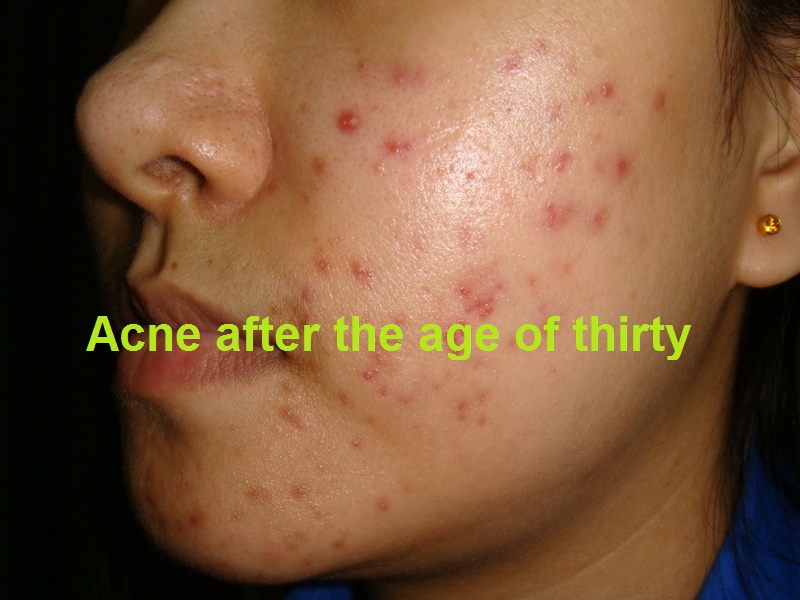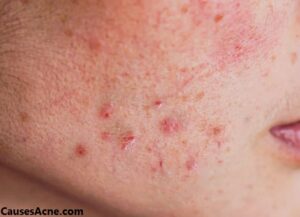
Acne is a common skin condition that affects people of all ages, but it is more common in teenagers and young adults. However, acne can also occur in women over 30. There are a number of factors that can contribute to acne in women over 30, including:

acne
- Hormonal changes: Changes in hormone levels, such as those that occur during menopause, can trigger acne breakouts.
- Stress: Stress can also trigger acne breakouts.
- Diet: Certain foods, such as dairy products, sugary foods, and processed foods, can contribute to acne breakouts.
- Skin care products: Using skin care products that are too oily or comedogenic (pore-clogging) can also contribute to acne breakouts.
- Medical conditions: Some medical conditions, such as polycystic ovary syndrome (PCOS), can also increase the risk of acne.
If you are a woman over 30 and are experiencing acne, there are a number of things you can do to treat it, including:
- Wash your face twice a day with a gentle cleanser.
- Use a toner to remove excess oil and dirt from your skin.
- Apply an acne medication, such as benzoyl peroxide or salicylic acid, to the affected areas.
- Avoid using skin care products that are too oily or comedogenic.
- Eat a healthy diet and avoid foods that trigger acne breakouts.
- Manage stress levels.
- If your acne is severe, see a dermatologist for treatment.
Causes of Acne in Women Over 30
The causes of acne in women over 30 are similar to those in teenagers and young adults. However, there are some specific factors that can contribute to acne in women over 30, including:
- Hormonal changes: Changes in hormone levels, such as those that occur during menopause, can trigger acne breakouts. During menopause, estrogen levels decline, which can lead to an increase in testosterone production. Testosterone is a hormone that can stimulate the production of sebum, which is an oily substance that can clog pores and lead to acne.
- Stress: Stress can also trigger acne breakouts. Stress can lead to an increase in cortisol production, which is a hormone that can stimulate the production of sebum.
- Diet: Certain foods, such as dairy products, sugary foods, and processed foods, can contribute to acne breakouts. These foods can increase inflammation in the body, which can lead to acne breakouts.
- Skin care products: Using skin care products that are too oily or comedogenic (pore-clogging) can also contribute to acne breakouts. These products can clog pores and lead to acne breakouts.
- Medical conditions: Some medical conditions, such as polycystic ovary syndrome (PCOS), can also increase the risk of acne. PCOS is a condition that causes an increase in androgen production. Androgens are hormones that can stimulate the production of sebum, which can lead to acne.
Treatment for Acne in Women Over 30
There are a number of things you can do to treat acne in women over 30. These include:
- Wash your face twice a day with a gentle cleanser. A gentle cleanser will help to remove excess oil and dirt from your skin, which can help to prevent acne breakouts.
- Use a toner to remove excess oil and dirt from your skin. A toner can also help to remove excess oil and dirt from your skin, and it can also help to tighten pores.
- Apply an acne medication, such as benzoyl peroxide or salicylic acid, to the affected areas. Benzoyl peroxide and salicylic acid are two common acne medications that can help to kill bacteria and reduce inflammation.
- Avoid using skin care products that are too oily or comedogenic. As mentioned above, using skin care products that are too oily or comedogenic can clog pores and lead to acne breakouts.
- Eat a healthy diet and avoid foods that trigger acne breakouts. Eating a healthy diet and avoiding foods that trigger acne breakouts can help to reduce inflammation in the body, which can lead to fewer acne breakouts.
- Manage stress levels. Stress can trigger acne breakouts, so it is important to find healthy ways to manage stress.
- See a dermatologist for treatment. If your acne is severe, you may need to see a dermatologist for treatment. A dermatologist can prescribe more potent acne medications or recommend other treatment options.
I hope this helps!
